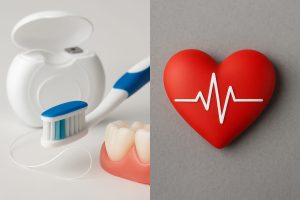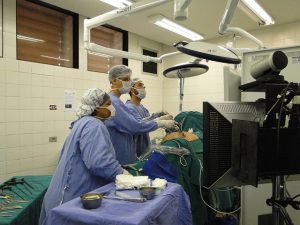 When most people think about brushing and flossing, they focus on keeping their teeth white and their breath fresh. But good oral hygiene does much more than protect your smile. Studies confirm that oral health is closely tied to cardiovascular health, a connection often highlighted by professionals at a Chicago loop dental clinic. Gum disease and infections from poor oral hygiene increase the risk of serious heart conditions.
When most people think about brushing and flossing, they focus on keeping their teeth white and their breath fresh. But good oral hygiene does much more than protect your smile. Studies confirm that oral health is closely tied to cardiovascular health, a connection often highlighted by professionals at a Chicago loop dental clinic. Gum disease and infections from poor oral hygiene increase the risk of serious heart conditions.
The Mouth-Heart Connection
Your mouth is full of bacteria—some helpful, some harmful. Brushing and flossing regularly keep these bacteria under control. But when oral hygiene is neglected, bacteria can multiply and cause gum inflammation, infections, and periodontal (gum) disease.
The trouble is that what happens in the mouth doesn’t stay in the mouth. Inflamed gums provide an entry point for harmful bacteria to enter the bloodstream. Once in circulation, these bacteria and the body’s inflammatory response can affect blood vessels and the heart itself. Over time, this can contribute to the development of heart disease, clogged arteries, and other cardiovascular issues.
Gum Disease and Inflammation
Inflammation helps protect the body, but when it becomes chronic, it damages blood vessels and accelerates plaque buildup in arteries. This plaque can narrow arteries, reduce blood flow, and in severe cases cause heart attacks or strokes.
How Oral Bacteria Impact the Heart
Gum disease bacteria can get into your blood and cling to blood vessel walls, studies show. Once there, they can trigger blood clot formation or contribute to the hardening of arteries (atherosclerosis). Both conditions raise the risk of heart problems.
Some oral bacteria also produce toxins that damage the lining of blood vessels, making them more vulnerable to blockages. When these blockages occur in the arteries that supply the heart, the result can be coronary artery disease—a major cause of heart attacks.
Shared Risk Factors
It’s also important to note that oral health and heart health share many of the same risk factors. Smoking, poor diet, diabetes, and inactivity raise the risk of both gum disease and heart disease—doubling the impact on your health.
Who Is Most at Risk?
Anyone can develop gum disease, but certain groups face higher risks of related heart problems:
- People with diabetes – High blood sugar supports bacterial growth and weakens the immune system, making it harder to fight gum infections.
- Smokers – Tobacco use restricts gum blood flow, delays healing, and promotes inflammation.
- Older adults – The risk of both gum disease and heart disease rises with age.
- Those with a family history of heart problems – Genetics can make both conditions more likely.
Signs Your Mouth May Be Affecting Your Heart
Because gum disease can progress silently, many people are unaware of the damage it causes. Common warning signs include:
- Gums that bleed during brushing or flossing
- Swollen, tender, or receding gums
- Persistent bad breath
- Loose teeth or changes in bite
If these symptoms are present, it’s essential to consult a dentist before the condition worsens and potentially affects your heart health.
Protecting Your Smile and Your Heart
Daily healthy habits can help reduce the risk of gum disease and protect your heart. Dentists and cardiologists alike recommend:
- Brushing twice daily with fluoride toothpaste
- Flossing once a day to remove plaque between teeth
- Seeing a dentist regularly for cleanings and checkups
- Quitting smoking if you use tobacco
- Eating a balanced diet rich in fruits, vegetables, and whole grains
- Managing conditions like diabetes and high blood pressure that affect overall health.
The Bigger Picture
Taking care of your oral health isn’t just about avoiding cavities or keeping your smile bright. It’s about protecting your whole body. The connection between gum disease and heart problems is a reminder that health is interconnected. Neglecting one part can put another at risk.
Final Thoughts
Poor oral hygiene can do more than cause tooth loss or bad breath—it can raise your chances of developing serious heart problems. Gum disease fuels inflammation and allows harmful bacteria to travel through the bloodstream, contributing to conditions like atherosclerosis and heart attacks.
Making oral care a priority is a simple but powerful way to support long-term heart health. Brush, floss, and keep those dental appointments—not just for your smile, but for your heart.



 Psychiatrists diagnose and treat the underlying causes of stress—such as anxiety, depression, or unresolved trauma.
Psychiatrists diagnose and treat the underlying causes of stress—such as anxiety, depression, or unresolved trauma.
 Feeling out of breath, as if you’ve just finished a marathon, can happen with or without chest discomfort.
Feeling out of breath, as if you’ve just finished a marathon, can happen with or without chest discomfort. To clean your lungs and remove pollutants, your brain tells you to cough. We cough to ease symptoms by constricting our chest and lungs.
To clean your lungs and remove pollutants, your brain tells you to cough. We cough to ease symptoms by constricting our chest and lungs.














 Male sexual enhancement pills that could likely be recommended by the urologist for man health are the supplements that have been clinically proven effective in increasing blood flow. Certain conditions such as stress, lack of sleep and unhealthy diets could result in poor blood circulation. In such cases, a man produces less testosterone, which in turn slows down his sex drive or desire for sexual engagements.
Male sexual enhancement pills that could likely be recommended by the urologist for man health are the supplements that have been clinically proven effective in increasing blood flow. Certain conditions such as stress, lack of sleep and unhealthy diets could result in poor blood circulation. In such cases, a man produces less testosterone, which in turn slows down his sex drive or desire for sexual engagements. Urologists recommend medications that can heighten the effects of naturally occurring nitric oxide that relax the muscles of the male reproductive organ during sexual arousal. Common ED medications generically known as sildenafil and tadalafil contain active nitric oxide ingredients that work to relax the penile muscles. Doing so allows increased blood flow in order to sustain the erection of the male organ.
Urologists recommend medications that can heighten the effects of naturally occurring nitric oxide that relax the muscles of the male reproductive organ during sexual arousal. Common ED medications generically known as sildenafil and tadalafil contain active nitric oxide ingredients that work to relax the penile muscles. Doing so allows increased blood flow in order to sustain the erection of the male organ.
 When asked about the most significant ways to have radiant skin, experts recommended laser treatments and chemical peels. Because they hasten the skin’s cell turnover, chemical peels are an excellent method to attain radiant skin.
When asked about the most significant ways to have radiant skin, experts recommended laser treatments and chemical peels. Because they hasten the skin’s cell turnover, chemical peels are an excellent method to attain radiant skin.
 Your cardiac physician and the person applying for PRP should know about your condition and the medications you take.
Your cardiac physician and the person applying for PRP should know about your condition and the medications you take.
